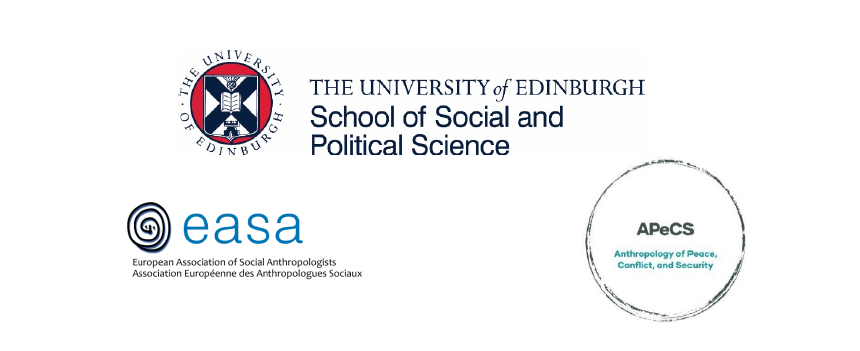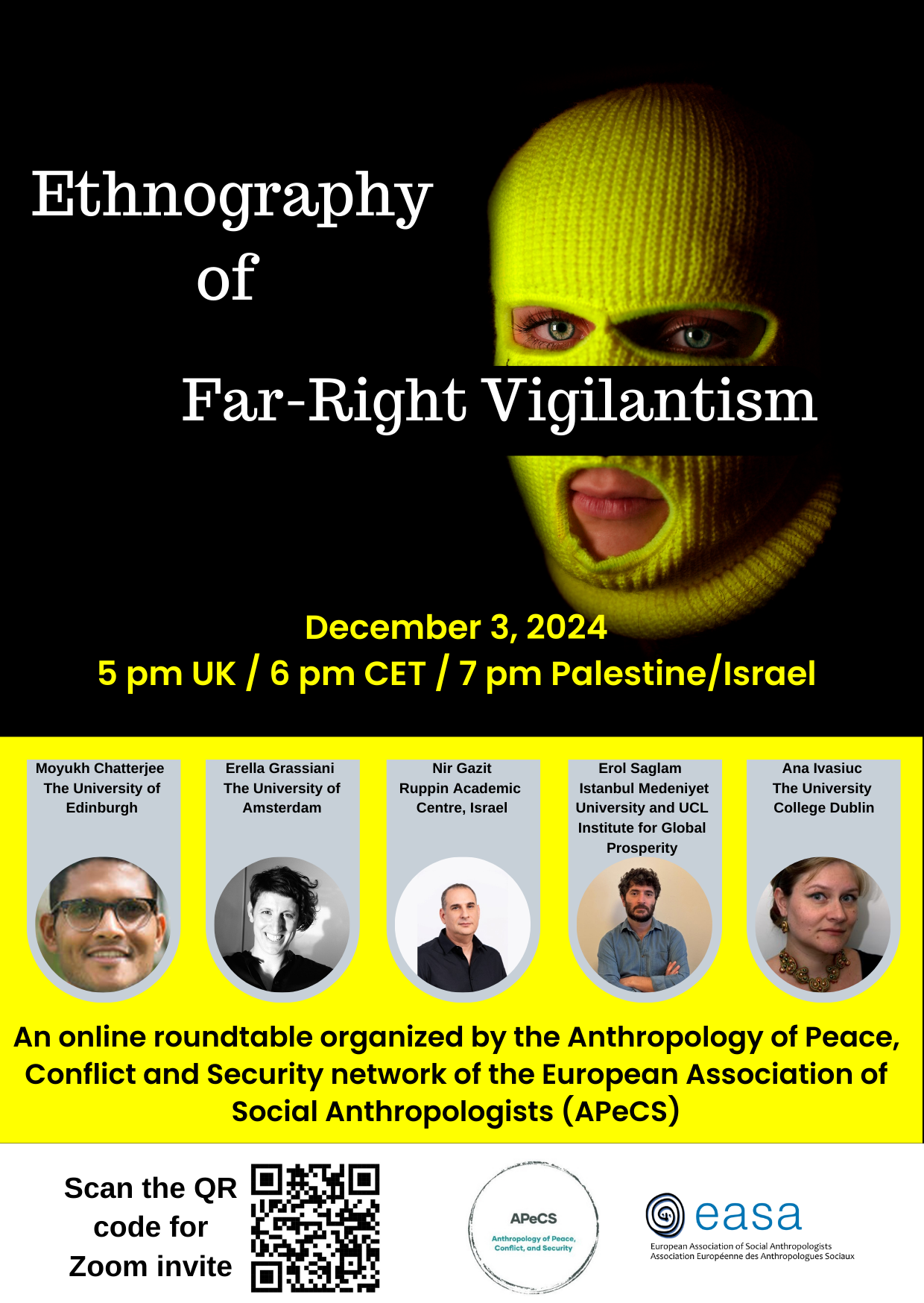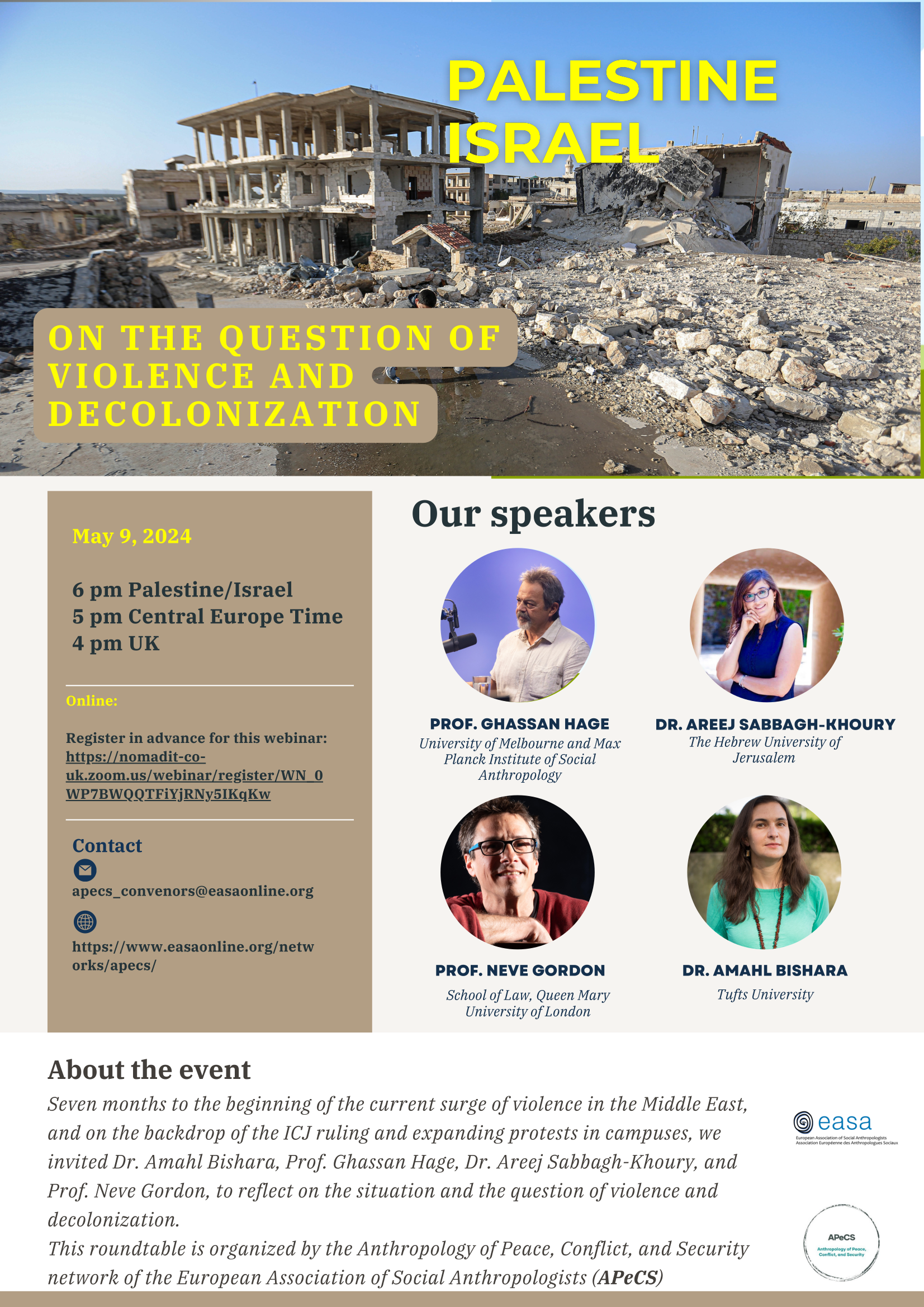APeCS - Events
Upcoming events
Future-Making in Times of Conflict, Violence and Insecurity
APeCS Conference 2025, University of Edinburgh, 2-3 June
The Call for Papers for the 2025 APeCS Conference “Future-Making in Times of Conflict, Violence and Insecurity” at the University of Edinburgh on 2-3 June is now open. Please submit your abstracts/paper proposals (150 words) directly to the convenors of the panel to which you wish to apply.
The deadline for submissions is 10 March 2025.
Past events
21–22 March 2024, Marburg, Germany
The Collaborative Research Centre “Dynamics of Security” (SFB/TRR 138) and the Anthropology of Peace, Conflict, and Security (APeCS) network of the European Association of Social Anthropologists (EASA) are organizing the joint, interdisciplinary conference.
We seem to be living in a time of crises that overlap and exacerbate each other, steering the world toward the brink of destruction. Multiplying armed conflicts, the consequences of climate change and fears of nuclear destruction, the rise of far-right ideologies and governments, economic turmoil, all these are vividly debated and give rise to a broadly shared sense that ours is an age of existential crisis. But contemporary situations of turmoil have long been on the make, and existential crises have been ongoing in many regions of the world. Thus, there is a historicity to current developments that is easy to overlook, and there are experiential registers that do not always find their way into dominant depictions of existential crisis.
14 March 2023, 3:00 PM GMT

Maryna Hrymych, Tina Polek, Taras Fedirko, and Volodia Artiukh will share their thoughts and their observations on Ukrainian society under the invasion, one year on. What kinds of debates, narratives, imaginaries, and forms of activism have emerged under the invasion, and how have they shifted with time? How does an anthropological lens complicate some of the debates that have perhaps been posed in too simplistic terms? What is the view 'from below' in Ukraine regarding life under the invasion, prospects for peace, solidarity, hope, and resistance? And last, but not least: how can we - anthropologists, non-Ukrainians - help?
Speakers
Taras Fedirko is Lecturer in Organised Crime and Corruption at the University of Glasgow. He is a political and economic anthropologist researching the new elites and political alliances that emerged from the war in Donbas and are currently leading the response to the Russian invasion of Ukraine. His earlier work work explored middle-class professionals involved in promoting or opposing political liberalism at the core (Britain) and semi-periphery (Ukraine) of global capitalism.
Tina Polek is an anthropologist at the NGO “Centre for Applied Anthropology” and a member of the European Association of Social Anthropologists. For the last five years, she worked as an applied anthropologist in non-commercial projects and as business anthropologist for Ukrainian companies. Among her last research projects are ‘The effects of the COVID-19 pandemic on children’s everyday practices’ (2021), ‘Balcony space: anthropological and sociological study’ (2021). Her research interests are urban and applied anthropology. She remained in Ukraine after the full-scale Russian invasion on 24.02.2022. Right now, she is on maternity leave.
Maryna Hrymych is a Ukrainian academician and writer. Her research interests include anthropology of war, anthropology of space and site, diaspora studies, traditional and digital folklore, customary law. She obtained a PhD in Filology (1991) and PhD in History (specialization Ethnology, 2005). Professor, PEN Ukraine member. Monographs: 2017 Anthropology of war. Case Study: The Division Halychyna; 2016 The Life under the Pineiros: The Cultural Landscape of Ukrainian Settlements in Brazil; 2006 The Civil Customary Law of Ukrainians; 2000 The Ukrainian Traditional Worldview; she is an editor of 15 volumes and an author of 150 articles. She conducted fieldwork research in Ukraine, Canada, Brazil and Middle East. Works at the The Ivan Honchar Museum National Centre of Folk Culture.
Volodymyr Artiukh is a Postdoctoral Researcher on the ERC-funded project ‘Emptiness: Living Capitalism and Democracy After (Post) Socialism’ at the University of Oxford. He completed his PhD in Sociology and Social Anthropology at the Central European University in 2020. His dissertation is an historically-informed analysis of labour in Belarus centred on workers’ agency in the context of bureaucratic labour control. Volodymyr is currently studying migration in the context of war-induced destruction in Ukraine. His project situates laboural and migratory experiences in the changing political and economic situation in Ukraine, Romania and Moldova. His research interests include the anthropology of work and labour organisations in post-Soviet countries, the anthropology of populism, and the comparative study of hegemonic practices in Eastern Europe.
This event is organized by APeCS - The Anthropology of Peace, Conflict and Security network of the European Association of Social Anthropologists.
25 April 2023
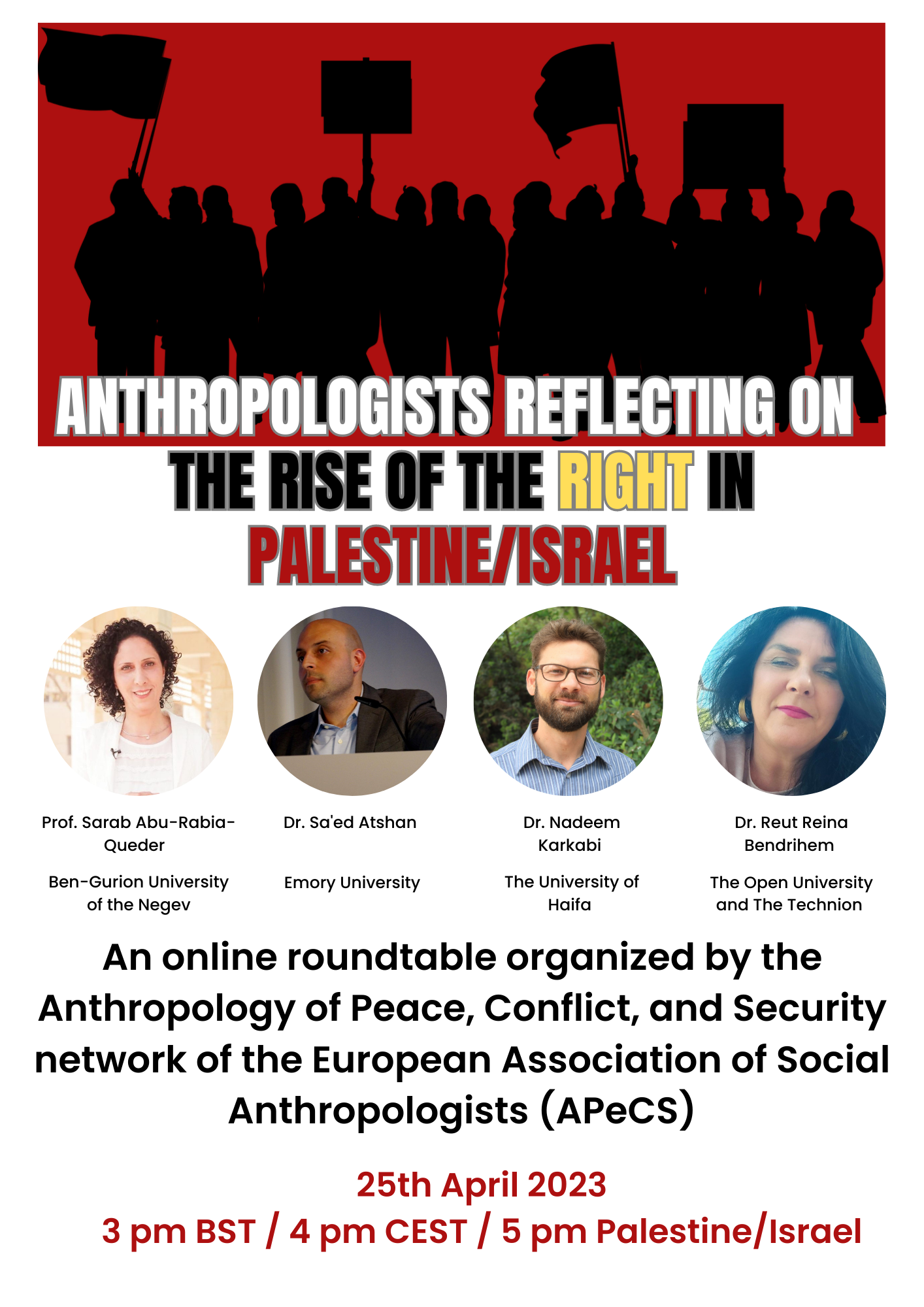
About this event
Prof. Sarab Abu-Rabia-Queder, Dr. Sa'ed Atshan, Dr. Nadeem Karkabi, and Dr. Reut Reina Bendrihem will share their reflections on the implications of the current Israeli government and the rise of the right on Palestinians and other discriminated, disempowered, and oppressed populations. Demonstrating, for example, what hidden or unconscious transcripts the current political upheaval has exposed.
Our speakers:
Prof. Sarab Abu-Rabia-Queder is an Associate Professor at the school of Education and the Vice President for diversity and inclusion at Ben-Gurion University of the Negev. Her studies focus on racial and gender inequality in the fields of higher education and employment among minorities in Israel. Prof. Abu-Rabia-Queder is a leading researcher in gender and women's studies in the Arab society and one of the first to explore feminist discourse in the Bedouin society, and is the winner of several competitive grants and prizes. Alongside her academic pursuits Prof. Abu-Rabia-Queder is also a feminist activist, fighting for women's rights. She serves as a board member in several NGO’s and academic committees. Her main activity focuses on issues central to Bedouin women's agenda such as access to education, combating polygamy, and improving employment opportunities.
Dr. Sa'ed Atshan is Associate Professor of Anthropology at Emory University. He has previously taught at UC Berkeley and Swarthmore College. Atshan earned a PhD at Harvard University and completed a postdoctoral fellowship at Brown University. He has published two monographs: Queer Palestine and the Empire of Critique (Stanford University Press, 2020) and The Moral Triangle: Germans, Israelis, Palestinians (Duke University Press, 2020). His coedited volume (with Katharina Galor), Reel Gender: Palestinian and Israeli Cinema, was published with Bloomsbury in 2022. Atshan is also a Palestinian Quaker LGBTQ human rights advocate.
Dr. Nadeem Karkabi is a senior lecturer in anthropology at the University of Haifa and a founding member of Insaniyyat - Society of Palestinian Anthropologists. His research on the Palestinian alternative music scene examined the relations between pleasure and politics, cosmopolitanism, middle class urbanity, and perceptions of self-liberation. Currently, he is working with third generation Mizrahi-Jews on music performances in Arabic language.
Dr. Reut Reina Bendrihem is a social anthropologist who deals with the field of anthropology of space and state. Her research is concerned with issues of social power, identity and the construction and production of space in the Israeli Negev. Reut Reina Bendrihem is an associate lecturer at Sapir College and the Open University, teaches anthropology, sociology, and social thought. She is an editor of the journal “HAGAR” Studies in Culture, Polities, and Identities, and was a postdoctoral fellow at the Technion's Department of Architecture and Urban Planning, Social Hub. Today she is a Research Fellow at the Faculty of Architecture and Town Planning in the Technion. She has recently won a research grant from the Israeli Ministry of Energy and leads research in cooperation with the Technion's Social Hub, the study deals with reducing energy poverty among Bedouins in the Negev.
Earlier Peace and Conflict Studies in Anthropology Network Events
The Making of Peace, Conflict and Security: Dynamics of Inclusion and Exclusion
28th-30th of August, University of Amsterdam
As one of PACSA’s largest conferences to date, the 6th Bi-annual meeting at the University of Amsterdam can be considered a major success. In addition to EASA’s generous support, the event benefited from the collaboration with a number of partners: the Anthropology of Security Network, SECURCIT (University of Amsterdam), the Dept. of Anthropology (VU University Amsterdam) and the research centre ‘Dynamics of Security: Forms of Securitisation in Historical Perspective.’ Alongside these partners, the summit benefitted greatly from the support of a diversity of individuals, including Ana Ivasiuc, Jelke Bosma, Giulia Traversari, Muriel Kiesel, Limor Samimian-Darash, Lior Volinz, Michael Rabi, Koen Donatz and Matthias Teeuwen.
With more than 150 participants, the conference spanned 20 panels distributed between three full conference days in four parallel rooms. The detailed programme can be accessed via the website under the following link: pacsa-web.eu/wp-content/uploads/2017/08/PACSA2017-booklet-def.pdf
In a multi-stage process, we had invited panel proposals and then peer-selected panels involving an advisory group of participating scholars. The successful panels were then compiled into a general call for papers whereby each paper proposal applied for a particular panel (some panels had already been proposed with a full list of speakers in the first place and were thus marked as closed). This allowed for a good mix of open and pre-organised panels. The panels were all geared to offer new insights and exciting discussions around the overall conference theme, exploring issues as diverse as peacebuilding, securitization, (non)violence, displacement, borders, the state, citizenship, and more. We received a record number of paper abstracts and successfully accommodated most of them.
In its aim to support young scholars and facilitate productive outputs, PACSA encouraged all conveners to think about follow-up initiatives and concrete publications as part of their panels. A dedicated early career workshop brought together a number of scholars in an open forum to discuss challenges and think about solutions to widespread problems collectively.
Alongside a fully-funded conference dinner for all participants in downtown Amsterdam, the summit offered a unique afternoon activity in collaboration with ‘Lampedusa Cruises’: a canal boat tour highlighting the role migrants have played in the making of Amsterdam, guided by recent migrants and refugees who arrived to the Netherlands. This made a great fit with the theme of Barak Kalir’s provocative keynote, ‘From Apartheid to Departheid: Or why “stop deportation” campaigns do not succeed’. Organised as an informed discussion rather than a singular lecture, the keynote featured a panel of discussants who are leaders in the field of refugee studies (Cindy Horst and Simon Turner). Unfortunately, a second keynote had to be cancelled last minute due to illness.
Panel: Spaces of security Panel in cooperation with the Anthropology of Security network at EASA2016 in Milan
Convenors Nils Zurawski (Universität Hamburg) Alexandra Schwell (University of Hamburg) email Silja Klepp (University of Bremen)
URL: http://nomadit.co.uk/easa/easa2016/panels.php5?PanelID=4047
Panel: Moral entrepreneurship: revisiting human rights
Convenors Susana Durão (UNICAMP (São Paulo, Brazil)) Daniel Seabra Lopes (CSG-ISEG/University of Lisbon) Elif Babul (Mount Holyoke College)
URL: http://nomadit.co.uk/easa/easa2016/panels.php5?PanelID=4141
Biannual meeting: Im/mobilities as products and generators of conflict
PACSA, the Peace and Conflict Studies in Anthropology network, held its 5th bi-annual meeting in Frankfurt this
September. The conference explored im/mobilities in the context of peace, violence, and conflict in two days of
exciting discussion, exchange and presentations. Co-hosted by the Peace Research Institute Frankfurt (PRIF) and
the Department of Social and Cultural Anthropology at the Goethe University, the meeting drew some 40
participants who addressed the mobility-conflict nexus from a variety of perspectives, among them displacement,
memory and identity, transnational networks, activism and state violence. Tobias Kelly, Head of Social
Anthropology at the University of Edinburgh, delivered the keynote lecture on the “Immobility of Human Rights,”
discussing the unequal distribution and mobility of human rights claims.
At the last EASA conference PACSA was present with 4 panels that covered issues such as Security, Soldiers, Justice, Violence and Intimacy
Panel: Security and citizenship at the EASA conference in Tallinn 2014.
URL: www.nomadit.co.uk/easa/easa2014/panels.php5?PanelID=3087
Panel: Soldier, security, society: ethnographies of civil-military entanglements at the EASA
conference in Tallinn 2014.
URL: www.nomadit.co.uk/easa/easa2014/panels.php5?PanelID=3016
Panel: The massacre and its Intimacy: violence among neighbors at the EASA conference in Tallinn
2014.
URL:
www.nomadit.co.uk/easa/easa2014/panels.php5?PanelID=3130
The ‘Local’ in Global Understandings of War and Peacemaking
Anthropological and inter-disciplinary perspectives
PACSA-PRIO CYPRUS CENTRE JOINT CONFERENCE
NICOSIA, 1-2 September 2011
The last century has seen a proliferation of conflict in different sites, and of varying scale and form - from civil and revolutionary/liberation struggles, to inter-communal and global wars and, as the case of Cyprus clearly shows, combinations of the above.
While much enquiry about the background of these conflicts, their nature and not least the so-called ‘war on terror’ have brought the international world order and the discourse of liberalism and democracy into question, ‘the local’ still retains a rather parochial position within mainstream peace and conflict studies, remaining the curious exemplar that may confirm or refute the efficacy of ‘international norms’. New approaches in anthropology attempt to break away from the local/global dichotomy by focusing on the interconnectedness and trans-locality of peace and conflict, or by exploring the everyday of conflict through ethnographies of violence and subjectivity.
PACSA workshops at EASA2010
W057 Vanguardism among Muslims
W078 Anthropology of categories in
peace and conflict
W086 Ethics in conflict: doing research
in conflict areas and the ethical dilemmas that arise
W100 The anthropology of international
organizations
W110 Observing the 'bad guys':
ethnographic approaches to non-state
armed groups
DGV-Conference 2009: call for papers for
Panel 29
Conflict and the (Re-)Appropriation of Normality / Konflikt und (Wieder-)Aneignung von Normalität
For a workshop description (in German) and contact details of the organisers please see / Die Beschreibung des
Workshops und die Kontaktdaten der Organisatoren finden Sie unter www.tagung2009.dgv-net.de/workshop_29.html
Second Biennial PACSA meeting, 9th- 11th October 2009
'Continuities and ruptures between conflict, post-conflict and peace'
Austrian Study Center for Peace and Conflict Resolution (ASPR), Peace
Center, Burg Schlaining, Austria
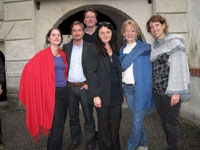
PACSA is a European network of social anthropologists who are interested in studying peace and conflict by putting people in the forefront of their analysis. Anthropologists organized in EASA felt that peace studies in Europe are by and large dominated by political sciences and international relations, favouring an institutional approach. Anthropologists are keen to emphasize the agency of people who are confronted by conflict and war with their theoretical approach, fieldwork and qualitative methodology. PACSA thus contributes greatly to make this critical and reflexive approach to peace and conflict more visible through networks, meetings and publications.

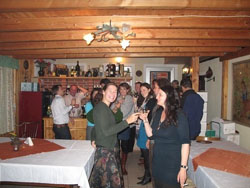
Many papers presented and discussed in the panels followed this creative and reflexive approach to peace and conflict studies. Instead of referring to every individual paper, I identify clusters and overlaps of common themes.
PACSA workshop at EASA06
PACSA held an inaugural panel session
at the 9th EASA Conference
First biennial PACSA meeting
Halle, Germany, 5 October 2007. Read the report.
PACSA workshops at EASA08
At the 10th Biennial Conference of the European Association of Social Anthropologists (EASA), held from 26 to 30
August in Ljubljana, Slovenia, PACSA members, as well as other colleagues working in the field of PACSA,
organized a number of panels and workshops, ranging from discussions of how ethnic identities are turned into
either-or categories in times of conflict (Workshop 053) to explorations of narratives of violence (W039), the
processing of trauma in post-conflict societies (W032) and how peace and conflict zones are connected with one
another (IW06). Here is a list of PACSA-related workshops:
Inivited Workshop 06: Connecting peace
and violence: Zones, transgressions and causes
Workshop 019: The anthropology of the
United Nations
Workshop 026: Imagining and
constructing "terrorism" and "war on terror"
Workshop 032: Processing trauma in
(post-)conflict societies
Workshop 039: Violence expressed
Workshop 050: Studying
anthropologists in war and conflict zones: Spies and freedom fighters, scholars and advocates
Workshop 053: Fragile transitions:
From coexistence to the emergence of hatred
Workshop 096: Memory and material
culture in post-conflict societies
Earlier Anthropology of Security Network Events
EASA2022 panel P166: (In)Security - What's the State Got to Do with it? [Anthropology of Security Network]
Wednesday 27 July, 2022, Belfast
Convenors: Alexandra Schwell (University of Klagenfurt), Ana Ivasiuc (Maynooth University), Monika Weissensteiner
https://nomadit.co.uk/conference/easa2022/p/11348
EASA2020 panel P116: The Future in Security: ethnographies of security at the edge of tomorrow [Anthropology of Security Network]
Tuesday 21 July, 2020, Lisbon
Convenors: Mark Maguire (Maynooth University), Alexandra Schwell (University of Klagenfurt) and Monika Weissensteiner (University of Kent)
https://nomadit.co.uk/conference/easa2020/p/8409
EASA2020 panel P077: Securitized Education: critical perceptions on the entanglements between military, security and education [Anthropology of Security Network, Peace and Conflict Studies in Anthropology PACSA]
Wednesday 22 July, 2020, Lisbon
Convenors: Erella Grassiani (University of Amsterdam) and Nir Gazit (Ruppin Academic Center)
https://nomadit.co.uk/conference/easa2020/p/8538
Security and Morality: Critical Anthropological Perspectives
University of Oslo, March 28 – 29, 2019
https://anthro-security.net/?p=210
The ASN Conference “Security and Morality: Critical Anthropological Perspectives” was held on March 28 – 29, 2019, at the University of Oslo. The conference provided a productive platform to explore security through a focus on morality and to share and exchange on research-projects at different stages. Participants greatly welcomed the conference topic and opportunity to analyse the security-morality nexus in their respective fields of research on counter-terrorism, humanitarianism, biker-clubs, migration control, policing, ‘community’ cohesion, victim-support programs and more. The topic also opened a space for reflections about the ethical challenges in doing research in a politically and morally highly charged field.
Meeting: The making of peace, conflict and security: the dynamics of inclusion and exclusion
Anthropology of Security network held a joint meeting with the The Peace and Conflict studies in Anthropology network (PACSA) in Amsterdam, 28-30 August. The conference had more than 150 participants, attending 20 panels.
Workshop: Spaces of Security
Maynooth, Ireland from 24 - 27th April 2016
URL: www.maynoothuniversity.ie/anthropology/events/spaces-security-wenner-gren-workshop-25-28-april-2016
Network members, alongside the well-known anthropologist Seth Low, received Wenner-Gren Foundation funding for this workshop. The workshop included participants such as Setha Low, Joseph Masco, Daniel Goldstein, Catherine Lutz and Katherine Verdery, Zoltan Gluck, Mark Maguire (host) and others.
Panel: Spaces of security Panel in cooperation with EASA's PACSA network at EASA2016 in Milan
Convenors Nils Zurawski (Universität Hamburg) Alexandra Schwell (University of Hamburg) email Silja Klepp (University of Bremen)
URL: http://nomadit.co.uk/easa/easa2016/panels.php5?PanelID=4047
Panel: Bodies of evidence, experts, and intimacy in the anthropology of security EASA conference
in Tallinn 2014
URL: www.nomadit.co.uk/easa/easa2014/panels.php5?PanelID=3135
The successes of the activities and discussions in our 2013 workshop (see below) led us to organize a panel at EASA 2014 in Tallinn on “Bodies of evidence, experts, and intimacy in the anthropology of security”.
Contributors included Gregory Feldman (Simon Fraser University) on “law, ethics, and an undercover police surveillance team”; “Human trafficking: the pivotal role played by the victims” by Desirée Pangerc (CIELS University Campus); “Suspicious bodies: camouflaged legality and tactics of security on the Argentina-Paraguay border” a paper by Ieva Jusionyte (University of Florida), and “Securitized immigration and the laboring body in the United States” by Daniel Goldstein (Rutgers University). There followed two papers on detention: “How serious is it?” Managing heavy diseases in a French immigration detention center” by Nicolas Fischer (Centre d’étude du droit et des institutions pénales), and Welcome to the myopticon: uncertain surveillance, removability and care in the Danish asylum system” by Zachary Whyte (University of Copenhagen); then Monika Weissensteiner’s paper “Evidence of pain: medico-legal expertise on torture within asylum proceedings”. The programme closed with presentations by Catarina Frois, Alexandra Schwell, Nadja Maurer, and Mark Maguire.
Network Meeting at EASA conference in Tallinn 2014.
During EASA 2014 we held a network meeting attended by dozens of interested anthropologists and several members of the PACSA- Peace and Conflict Studies in Anthropology network interested in future collaborations. We agreed to explore a number of new avenues of research (partly in collaboration), set up a listserve and web presence.
Bodies of Evidence – December 10, 2013
Participants: Christina Garsten (Stockholm), Nils Zurawski (Hamburg), Mark Maguire (NUIM), Christopher Farrands
(Nottingham), Ursula Rao (Leipzig), Giovanni Ercolani (Nottingham), Zachary Whyte (Copenhagen)
Keynote: Jean Comaroff, Alfred North Whitehead Professor of African and African American Studies and of
Anthropology, Oppenheimer Research Fellow, Harvard University
Securing Europe: Anthropological Perspectives – March 28-9, 2011(Sponsored by the IRCHSS)Participants: Gregory Feldman (Simon Frazer), Susana Durão (ICS/UL), Daniel Goldstein (Rutgers) Ines Hasselberg (Sussex), Nicolas Fischer (CNRS), Catarina Frois (Lisbon)






